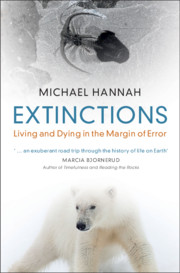Book contents
- Extinctions
- Reviews
- Extinctions
- Copyright page
- Epigraph
- Dedication
- Contents
- Preface
- Acknowledgements
- Further Reading
- Introduction
- 1 The Anthropocene and the Earth System
- 2 A Short Detour: The Fossil Record and the Geological Time Scale
- 3 The Origin of Animals and the Emergence of the Earth System
- 4 Documenting Ancient Biodiversity
- 5 Mass Extinctions: The Basics
- 6 Causes of the End-Permian and End-Cretaceous Extinction Events
- 7 Time Heals All: Recovering from a Mass Extinction
- 8 The Late Quaternary Megafaunal Extinctions
- 9 Surviving the Anthropocene
- Book part
- Further Reading
- Index
6 - Causes of the End-Permian and End-Cretaceous Extinction Events
Published online by Cambridge University Press: 01 September 2021
- Extinctions
- Reviews
- Extinctions
- Copyright page
- Epigraph
- Dedication
- Contents
- Preface
- Acknowledgements
- Further Reading
- Introduction
- 1 The Anthropocene and the Earth System
- 2 A Short Detour: The Fossil Record and the Geological Time Scale
- 3 The Origin of Animals and the Emergence of the Earth System
- 4 Documenting Ancient Biodiversity
- 5 Mass Extinctions: The Basics
- 6 Causes of the End-Permian and End-Cretaceous Extinction Events
- 7 Time Heals All: Recovering from a Mass Extinction
- 8 The Late Quaternary Megafaunal Extinctions
- 9 Surviving the Anthropocene
- Book part
- Further Reading
- Index
Summary
Up until this chapter, I have avoided discussion of what causes a mass extinction. Rather than a run-through of each mass extinction, I concentrate on two; the largest, the end-Permian; and the most controversial, the end-Cretaceous. Many (most) mass extinctions are linked to the environmental damage that results from the eruption of a Large Igneous Province (LIP) – that is certainly the case with both the end-Permian and end-Cretaceous. At the end of the Permian, the eruption of the Siberian Traps resulted in global warming and caused ocean waters to become both anoxic and acidic, resulting in the largest mass extinction seen on the planet.The situation of the end-Cretaceous is more complex. The eruption of the Deccan Traps placed significant environmental stress on the planet’s ecosystem which is recorded as shifts in the composition of the biota prior to the event. But the impact of a meteor is also involved in this extinction event, and it may have delivered the coup de grace.
Keywords
- Type
- Chapter
- Information
- ExtinctionsLiving and Dying in the Margin of Error, pp. 125 - 158Publisher: Cambridge University PressPrint publication year: 2021

